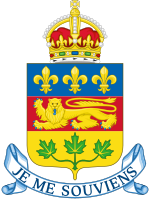This article needs additional citations for verification .(February 2024) |
| History of Quebec |
|---|
 |
| Timeline |
| Territory of Quebec |
|
| Topics |
This section of the Timeline of Quebec history concerns the events relating to the province of Quebec, Canada between the enactment of the British North America Act 1867 and the end of the 19th century.